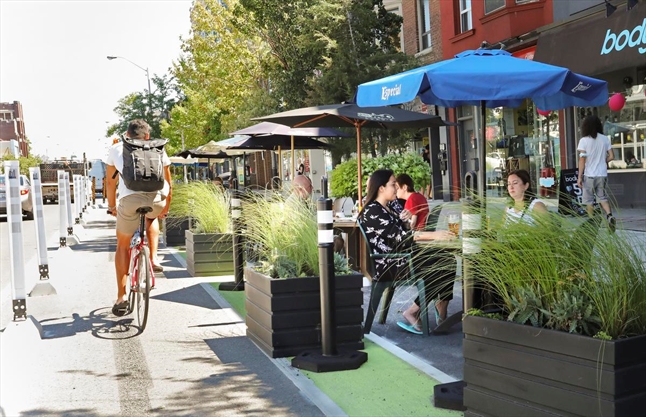The curbside patios and bicycle-lane bump-outs along Danforth Ave. that drew widespread acclaim this summer are about to be packed up.
The city’s Planning and Housing Committee voted Tuesday to extend patio season in Toronto until May 2021, with the exception of patios that were set up in curb lanes.
Those must be closed in the next few weeks, to allow winter road clearance to swing into action as soon as the snow begins to fly.

“As much as we would love to leave the patios in the curb lanes, all of those patios will come out,” said Mayor John Tory, at a press conference Tuesday morning. “We have to plow the roads when it starts to snow.”
All curb locations for CafeTO, including those on Danforth Ave., must be removed before Nov. 15, according to the city. All ActiveTO cycling network locations, including the Danforth, are scheduled to remain in place until the fall of 2021.
When curb-lane patios along Danforth Ave. are removed, the bike lanes will be realigned to the curb to match the rest of the cycling corridor. Parking and loading opportunities that were temporarily removed to provide patio space will be reinstated.
Restaurant owners were doubtful Tuesday that extending the patio program will provide a significant source of revenue during the coldest months of the year, adding to the financial problems has already created for them.
“They’re not really giving us anything unless we have some miracle Indian summer and it’s 25 degrees in the first week in November or December,” said George Markakos, who owns Factory Girl on the Danforth. “Then it would be wow — we’re still open — but that’s very unlikely.”
He was able to take advantage of the patio program this summer that gave restaurants more latitude when it comes to setting up tables in curb lanes, sidewalks and parking lots, by setting up an additional 50 tables outside, including in the curb lane. He’s grateful for that; without it, he would be much worse off financially today.
But he wouldn’t have continued operating in the curb lane even if the city would have permitted it.
He doesn’t think extending the patio season in a city with a cold winter climate is likely to bring in extra business, even if he were would be able to put out heaters — and moving heaters inside at the end of the day just isn’t practical, because they’re so large and heavy.
“This is Canada. Outdoor dining in below-zero weather is just not an option,” said Markakos, who has run as many as three restaurants at a time in Toronto and was hoping to retire before the pandemic hit and his business began operating at a loss.
Restaurateur David Currie of Le Paradis, said while being able to expand his patio during the summer was helpful, he’s not sure keeping it open in winter will be practical. Most of the food, unless he served just piping hot soups and stews, would be cold by the time it got to the table. All it would take would be a cold wind to make an outdoor patio inhospitable in winter, even with heaters.
“It’s hard to make a business plan out of this,” he said.
In the end, he said, it will depend on what kind of enclosures will be allowed and how much they will cost — Tory even raised the possibility of permitting bubble enclosures, but details of what will be permitted have not been finalized.
The matter is likely to be discussed in the context of the city’s recovery plan Wednesday at executive committee. The recommendations approved Tuesday, including looking at options for providing shelter on winter patios, will be considered by city council on Oct. 27.
James Rilett, a spokesperson for Restaurants Canada, said restaurants need capital to invest in winter patios and after months of reduced business due to restrictions brought on by the pandemic, they don’t have any capital reserves left.
“We’re almost eight months into this now, and some restaurants have accrued so much debt it will be hard to invest in something that they’re not sure if it’s going to work out or not,” he said. “There is a feeling of hesitancy.”
Tony Elenis, chief executive of the Ontario Restaurant Hotel and Motel Association, said efforts to extend outdoor dining are better aimed at making indoor dining safe.
“Extending the patio season is welcomed — it has a good intent,” said Elenis, whose association represents operators about 11,000 Ontario hospitality businesses. But to do it well, it would end up resembling an indoor space, which would be subjected to the same restrictions on dining in that restaurants are currently facing.
“The focus should be to work in making the indoor room safer and increasing consumer confidence,” he said.
He added that a safety accreditation program for restaurant and bar staff and improving the federal COVID Alert app would help.
With files from David Rider
Francine Kopun is a Toronto-based reporter covering city hall and municipal politics for the Star. Follow her on Twitter:
